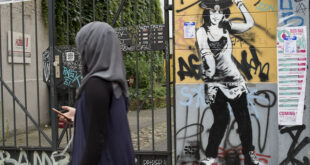Compiled by the editors
May 2004
Abu Dhabi TV announces "a modest but varied" programming season to parallel that of other satellite channels. News programming is tapped to take a back seat compared to variety shows. The absence of "arts" programming is explained by the station by reference to its policy of "not going along with everything that is done by other channels to make money at the expense of form and content." (Asharq Al-Awsat, 5 May, 2004, p.18)
The death of Al Jazeera reporter Rashid Hamid Wali on 20 May is reported. Wali was struck by a bullet while in his hotel in Karbala during slashes between supporters of Muqtada Al-Sadr and US forces. Al Jazeera did not specify the source of the bullet. More than 25 journalists are reported to have lost their lives in Iraq since the start of hostilities in March 2003. (Asharq Al-Awsat, 22 May, 204, p.2)
An Al Arabiya reporter is detained by US forces on May 21 "while covering events." (Idem.).
June 2004
Emirates Dubai TV (EDTV) re-launches 1 June, 2004. (Al Hayat, 25 May, 2004, p.20). (See Dubai TV's New Look in this issue.)
Al-Sharqiyya, Iraq's private satellite station, launches 11 June, 2004, with programming consisting of "political comedy and …independent news coverage." The station is founded by Saad Al-Bazzaz, editor in chief of newspaper Al-Zaman, with funding from "local and foreign investors." Alaa Al-Dahhan is director. (Al Hayat, 19 June, 2004, p.20).
August 2004
A "new crisis" is reported in relations between Al Jazeera and the Tunisian government, which is said to have "disputed" the appointment of Tunisian national Lutfi Hajji as the channel's new correspondent. Observers attribute the government's objection to the fact that the journalist is the founder and chairperson of the country's first journalists' syndicate. The dispute takes place against a background of tense relations between the government of President Ben Ali and Al Jazeera caused by issues such as Al Jazeera's coverage of Tunisia's 1999 elections and an appearance by Islamist opposition leader Rashid Al-Ghannoushi on a talk show. (Al Hayat, 7 August, 2004, p.13).
Iraq's Transitional Government ordered August 7 the closure of Al Jazeera's office in Baghdad claiming that four weeks monitoring by a specially-appointed committee had revealed that the channel was guilty of "incitement to violence and hatred." A wek earlier Iraq's information minister, Fallah Al-Naqib, had accused Arab satellite channels of encouraging kidnapping by showing scenes of hostages threatened with execution. (Al Hayat, August 8, 2004, p.2)
September 2004
Amr Al-Khafagi is appointed president of Dream Channel, replacing Sana' Mansour, who had resigned in protest at "the interference of certain members of the station's administrative board in certain media-related matters." (Al Hayat, 20 September, 2004, p.21)
Mazen al-Tumeizi, a reporter for Al Arabiya, is killed on air by US fire while covering a demonstration in Baghdad. (Belfast Telegraph, September 13, 2004)
October 2004
Mark Helmke, congressional committee on foreign affairs staffer, announces that changes in the staffing of Alhurra "are being studied." These would include the promotion of Muwaffaq Harb, Alhurra's editor-in-chief to the position of vice president of the Middle East Television Network (MTN) network that manages Alhurra. Congress's Broadcasting board of Governors is also reported to have decided to bring Radio Sawa, the US government's Arabic-language public diplomacy station, under MTN in an effort to "give both Alhurra and Radio Sawa greater independence in decision-making" as of November 2004. (Asharq Al-Awsat, 1 October, 2004, p.5) (See US International Broadcasting Strategies in the Arab World in this issue)
Qatari and Jordanian state televisions announced that they would not be broadcasting Al-Tariq ila Kabul (The Road to Kabul), a 30-part soap-opera due for transmission during Ramadan. According to the former, which was financing the series, the soap was "not technically ready" on the eve of Ramadan. Qatari television officials denied having yielded to a warning issued over the Internet by a previously unknown group calling itself The Mujahedeen Brigades of Iraq and Syria which threatened "all those who contributed to making this soap opera, actors, producers, cameramen, if it contains insults to the Taliban." (Gulf News, 17 October, 2004, p.11). MBC and Orbit both broadcast the first eight parts but were unable to obtain further episodes and were reported to be considering legal action against the producers. (Asharq Al-Aqwsat, 24 October, 2004, p.16)
Al-Arabiya's Baghdad offices were damaged, at least 6 persons killed, and 19 injured, in a car bomb attack on 30 October, 2004, that also affected the offices of Saudi satellite channel Al-Ekhbariya, housed in the same building. (AlHayat, 31 October, 2004, p.1) A previously unknown group called The Jihadist Martyrs' Detachments in Iraq claims responsibility, accusing Al-Arabiya of its "persistent glorification of the Allaoui government." (Al Hayat, 1 November, 2004, p.7)
November 2004
Taysir Allouni, the Al Jazeera Madrid bureau chief accused by Spanish authorities of acting as a pay-master and recruiter for Al-Qa'ida, is re-arrested November 7. First arrested in October 2001, Allouni was released on bail for health reasons in October 2003. Authorities referred to evidence of a probable attempt to leave Spain by Allouni in the run-up to his trial. (Asharq Al-Awsat, 20 November, 2004, p.9)
 Arab Media & Society The Arab Media Hub
Arab Media & Society The Arab Media Hub




